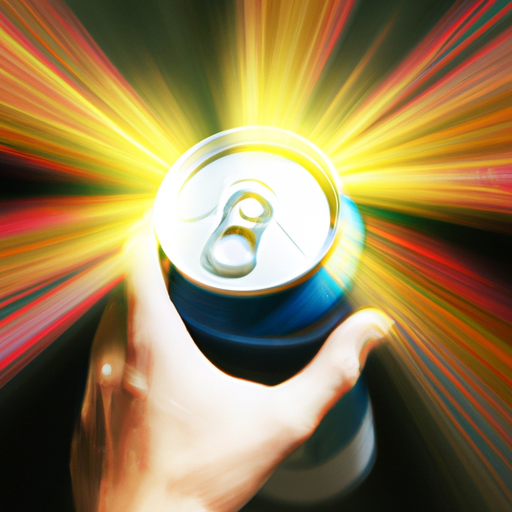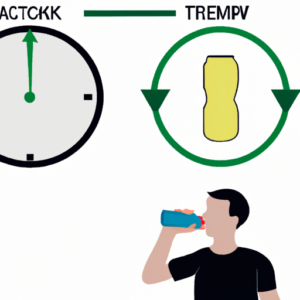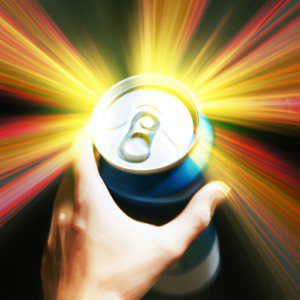Energy drinks have become increasingly popular among consumers in recent years. While they are often thought of as a way to gain energy, these beverages can also provide immune boosting benefits.
This article will discuss the surprising ways that energy drinks can help boost one’s immunity. The potential of energy drinks to enhance and support one’s overall health has only recently been explored. Research suggests that certain ingredients found within them may promote better functioning of the body’s natural defense systems.
The purpose of this article is to explore how consuming energy drinks affects an individual’s immune system and which components of these beverages contribute to improved immunological health.
Caffeine And Its Role In Immune Function
Caffeine is a stimulant that can be consumed in the form of energy drinks and has been studied for its potential effects on immune function.
Research has shown that caffeine intake may have an impact on adaptive immunity, which involves both cellular and humoral responses to antigens.
It appears that moderate amounts of caffeine consumption may lead to beneficial changes in the body’s response to immunological challenges.
The role of sleep deprivation when it comes to immune system functioning should also not be overlooked.
Studies suggest that inadequate rest or lack of quality sleep could impair certain components of the adaptive immune system, such as macrophage activity and antibody production.
As such, regular consumption of energy drinks containing high levels of caffeine could help offset some of these negative impacts by providing individuals with more alertness during times when adequate rest cannot be obtained.
However, it should be noted that excessive use of caffeinated beverages could contribute to health issues due to fatigue, increased stress hormones, dehydration or other factors related to overconsumption.
Therefore, caution should always be taken when consuming energy drinks or any caffeinated beverage in order to ensure optimal performance and overall health.
Vitamin B6 And Immunity
‘An apple a day keeps the doctor away,’ is an old adage that proves true even today. Along with eating healthy, energy drinks can also work to boost your immune system through vitamins and minerals like vitamin B6.
Vitamin B6 helps regulate many bodily processes such as mineral absorption and gut health — two important components for maintaining optimal immunity. Vitamin B6 has been linked to increased lymphocyte production in humans which help protect against infection by recognizing and destroying foreign substances within the body.
It increases levels of antibodies produced by immunoglobulins, helping fight off bacteria or viruses more quickly than without it. This makes Vitamin B6 essential for supporting the growth of healthy cells needed for immunity. A deficiency in this particular vitamin can lead to weakened immune systems, making those individuals more susceptible to illnesses and infectious diseases.
By including Vitamin B6 in our diets – whether through food sources or supplementation via energy drinks – we’re able to keep our bodies functioning at their best so they are better equipped to handle any pathogens that may come along.
The Benefits Of Ginseng
Ginseng is an adaptogenic herb that has been studied extensively for its ability to support the body’s immune system. It contains a wide range of active components, including ginsenosides, saponin and polysaccharide compounds, which have various beneficial effects on health.
Ginseng has demonstrated potency in enhancing immunity by modulating key elements of the immune system such as T-cell activation, cytokine production and natural killer cell activity.
It has also been found to regulate moods and alleviate stress due to its anti-inflammatory properties, as well as supporting cardiovascular health with antioxidant action.
Studies suggest that ginseng can help protect against viral infections and improve the overall functioning of the immune system through regulation of physiology processes involved in both innate and adaptive immunity.
In particular, it has been found to influence secretion levels of immunomodulators like interferons, tumor necrosis factor (TNF), interleukin 1 beta (IL-1β) and interleukin 6 (IL-6).
Additionally, research indicates that ginseng can inhibit pro-inflammatory pathways while stimulating anti-inflammatory ones. Its antiviral activities are thought to be mediated through inhibition of virus replication at multiple stages during infection, including blocking entry into host cells or preventing virus assembly inside them.
Therefore, regular intake of ginseng may assist in maintaining strong defenses against pathogens by helping regulate cytokines responsible for initiating inflammatory responses within the body’s defense network. This highlights how important this herbal remedy is when considering ways to boost our immune systems naturally over time if taken consistently under the guidance of qualified healthcare professionals.
The Protective Effects Of Antioxidants
Ginseng has long been praised for its powerful health benefits, and the protective effects of antioxidants should not be discounted.
While ginseng is known to stimulate the immune system, antioxidants play an equally important role in bolstering overall immunity. As a powerful defense against free radicals, these compounds can provide vital protection from oxidative stress that weakens cells and tissues throughout the body.
Antioxidants are found naturally in many foods such as fruits and vegetables, but they can also be taken through supplements or fortified drinks. Many antioxidant-rich options contain high concentrations of vitamins A, C, and E along with amino acids and probiotics which have all been linked to improved immune responses.
For example, studies suggest that certain amino acids may help reduce inflammation while probiotics may act as immunostimulants by stimulating white blood cell production.
A combination of both ginseng and antioxidant rich foods offers multiple pathways to bolster one’s immune system. With regular consumption of nutritious food sources plus adequate amounts of restful sleep each night, individuals can build up their resilience to better withstand any foreign invaders that come their way.
To maximize the potential benefits it is recommended to consume a wide range of nutrient dense ingredients on a daily basis for sustained optimal wellness over time.
The Impact Of Sugar On Immunity
Sugar consumption can have a major impact on the body’s immune responses. Recent studies indicate that high sugar intake may reduce overall immunity and increase susceptibility to infections by altering key pathways in the immune system.
Excessive amounts of sugar consumed over time can lead to an overload of glucose, which impairs white blood cells from functioning optimally and reduces their ability to fight off pathogens.
The potential immunological effects of consuming energy drinks are largely dependent on ingredients such as added sugars. Studies suggest that sucrose or fructose-sweetened beverages may be associated with suppressed innate immunity while saccharin sweetened drinks had no effect on any measure of immunity.
Furthermore, research has indicated that long-term excessive consumption of these sugary energy drinks could impair some aspects of adaptive immunity due to reduced antibody production and impaired cell signaling within the immune pathway.
Therefore, it is important for individuals who consume energy drinks regularly to pay attention to the amount of sugar they are ingesting and its potential impacts on their health. It is essential that consumers read labels carefully to avoid inadvertently weakening their natural defenses against infection and disease by taking in too many calories from added sugars found in some energy drinks.
Frequently Asked Questions
What Are The Long-Term Effects Of Drinking Energy Drinks?
The long-term effects of drinking energy drinks can be highly detrimental to one’s health. Due to the caffeine content, excessive consumption of energy drinks has been linked to higher rates of heart and blood pressure issues as well as an increase in feelings of anxiety or restlessness.
Furthermore, research suggests that regular intake of these beverages may cause changes in dietary habits as well as reduced motivation for exercise due to a decrease in available energy reserves. As such, it is important to consume energy drinks responsibly and only when needed, rather than relying on them regularly.
How Much Caffeine Is In An Energy Drink?
Caffeine is often thought of as an energy source, akin to a spark plug for the body.
It can provide short-term boosts in alertness and focus but can be dangerous if taken in excessive amounts.
On average, most energy drinks contain 80mg of caffeine per 8oz serving, although this amount varies by brand.
When making decisions about how much caffeine to consume, it’s important to consider other sources such as coffee or tea; those looking for natural alternatives may turn to other food sources like dark chocolate or nuts which offer healthy doses of antioxidants with less risk than pure caffeine.
Are Energy Drinks Safe For Children?
The safety of energy drinks for children is a topic that has been debated by medical professionals.
Recent studies have shown that high levels of caffeine and sugar can lead to negative health effects in toddlers, including an energy overdose.
As such, medical experts advise against the consumption of these beverages by young children due to their potentially hazardous ingredients.
Furthermore, it is important to note that since energy drinks are not regulated like other foods or beverages, they may contain additional ingredients with adverse side effects, making them even more dangerous for very young consumers.
Are There Any Alternatives To Energy Drinks That Provide Similar Immune System Benefits?
Herbal teas and adaptogenic herbs provide a natural alternative to energy drinks in terms of immune system benefits.
Various studies have found that herbal teas can reduce inflammation, while adaptogens help the body maintain balance during physical or emotional stress.
Regular consumption of these beverages has been linked to improved cardiovascular health and overall well-being.
Furthermore, they are low in calories and contain no added sugar, making them an ideal choice for those looking for healthier alternatives to energy drinks.
What Are The Recommended Daily Intakes Of Vitamins And Minerals For Optimal Immune System Function?
Nutrients play an important role in providing immune protection and optimal functioning of the body’s immune system.
Recommended daily intakes for vitamins and minerals vary depending on age, sex, physical activity level, health status, etc., but some general guidelines exist to help ensure proper nutrient intake for immune health.
Vitamins A, B6, B12, C and E are all essential nutrients that support a healthy immune system.
Minerals such as zinc, selenium and iron are also critical components of the diet to maintain a well-functioning immune system.
The best way to obtain these necessary nutrients is through food sources such as fruits, vegetables, nuts and grains; however supplements can be taken if dietary deficiencies occur or specific circumstances require higher levels than what can be obtained from food alone.
Conclusion
It is clear that energy drinks can have a positive effect on the immune system.
However, it is important to be mindful of caffeine intake and keep consumption within the recommended daily limits.
Additionally, more research should be done into alternative options for providing similar benefits while avoiding any potential risks associated with high-caffeine beverages.
All in all, striking a balance between healthy lifestyle choices and occasional indulgences may provide the best chance at maintaining an optimal level of immunity.
In other words, moderation may prove key when it comes to boosting your immune system through energy drinks or otherwise.




